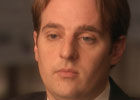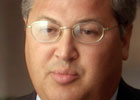Its duty is to pass legal judgment on what the administration wants to do. Post 9/11, Vice President Dick Cheney and his legal adviser, David Addington, used this small but powerful Justice Department office to build the legal framework that would enable them to gather as much power as possible for the president.
- Charlie Savage
- Bruce Fein
- Evan Thomas
- Jack Goldsmith
- Jane Mayer
- Douglas Kmiec
- Related Links
- Interviews with John Yoo
FRONTLINE has published two extended interviews with former Office of Legal Counsel Deputy John Yoo in which he discusses his memoranda authorizing the president to act with unparalleled authority in prosecuting the war on terror. One interview is from 2005's The Torture Question; another 2007 interview is from Spying on the Home Front.
Charlie Savage
Author, Takeover: The Return of the Imperial Presidency and the Subversion of American Democracy
[What is the Office of Legal Counsel?]
The Office of Legal Counsel [OLC] is the most important legal office in the federal government. Even though no one outside of Washington has heard of it, it wields absolutely enormous powers. It is the office which tells the executive branch, from the president to the military to the CIA to anyone else, what the law is. ... The judgment of these lawyers and their ability to issue binding legal interpretation becomes the law. ... A memo from the Office of Legal Counsel that gives legal cover to an action means that you are acting in good faith that what you were doing was proper.
Because it has this power, the Office of Legal Counsel is the only agency that can really at the end of the day tell the president no, and they have an enormous responsibility, a solemn duty, to tell the president no if the best reading of the law says that a proposed policy is illegal. ...
[Who heads the OLC at the beginning of the administration?]
... There was a fight between the White House legal team, dominated by Addington, and the Justice Department legal team, dominated by John Ashcroft, over who would get to control the Office of Legal Counsel. Each of them had their preferred candidates, and the candidates were unacceptable to each other. Months and months passed without someone coming in permanently to head it. ...
The Senate would not confirm Jay Bybee, a UNLV professor who became the second compromise candidate, until October, and he was still teaching law, and he did not come out and join the administration until after Thanksgiving of 2001. That meant that for several months after the terrorist attacks of 9/11, this sort of leaderless office, run by people who had not had to undergo Senate confirmation vetting, were able to put in place the entire legal framework for what would be the most important policies in the war on terrorism.
The principal author of most of these memos was John Yoo, a Berkeley law professor who's now back at Berkeley. He has tenure. John Yoo was young. He was very conservative, and he had made his name in academia by writing law journal articles and speaking at events in which he would take a very provocatively revisionist stance about the scope of executive power. His essential argument was that everyone had misunderstood what the founders did for the last 200 years; that the founders were not trying to make a decisive break with the British king, but, in fact, in many, many ways thought that the president should have the same powers that the British king had when it came to matters of national security. ... Most people, overwhelmingly, who are specialists in the law reject this reading of what the founders did. But it was an interesting point of view in the '90s, and it got published because it was interesting to think about. ...
However, when [Yoo] became the Office of Legal Counsel deputy in charge of the national security and foreign affairs portfolio and had no boss after 9/11, it allowed him to put these theories into pragmatic effect by writing secret advisory opinions that stated these theories as true, citing his own work from the '90s as authority for why they were true.
These established then a framework in which the president had legal cover for launching a surveillance program which contradicted the statute requiring a judge's approval whenever the government wanted to intercept phone calls and e-mails of American citizens, convening military commissions on his own authority without going to Congress, sidestepping the Geneva Conventions, a Senate-ratified constraint on how a commander in chief can treat prisoners and so forth. ...
Bruce Fein
Associate deputy attorney general, 1981-'83
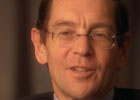
How important was it that Yoo [was the White House's point person at the OLC?]
It's very important and troublesome because the law in this area, constitutional law, separation of powers, is as much prudence as it's not wealth of decisions, as it is technical examination of the words or the origins of the constitutional language. And that's why you need people who've got some political seasoning as well. All right, maybe we could do this, but shouldn't we consult Congress? Or there's these other political ways to deal with this. That's more in the tradition of the United States democracy and the Constitution. …
And when you just have someone like John Yoo -- who's a very smart individual, I've debated him before, but he's inexperienced politically, he's very young -- being the sole person in the Department of Justice who's giving you advice, that's very worrisome. It's not to denigrate his legal skills, but there's a whole, whole history in volumes of prudence here that could be tapped from Ashcroft and others.
[Wouldn't he say he was giving the client what it wanted?]
Yes, of course he's got to do what the client wanted. And I think that's what you would expect. He's a deputy assistant attorney general in the Office of Legal Counsel. He doesn't have the stature or the clout that the attorney general could have to say, "I'm the cabinet officer of Senate confirmation. This doesn't work."
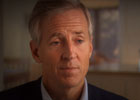
Nominally, John Yoo at OLC reports to his boss, the attorney general, Ashcroft. But in fact, Yoo was reporting to Addington at the vice president's office. Well, no bureaucrat worth his salt is going to like that situation. … It irritated Ashcroft that Yoo was, in effect, going behind his back, and going straight to the White House, and working for them and not for the attorney general. …
Yoo paid for his apparent disloyalty to Ashcroft. Because when the head of OLC, Bybee, went off to become a federal judge, well, Yoo was the natural candidate of the vice president's office to take over OLC. But Ashcroft said, "Forget about it." He wanted somebody who was loyal to him. He didn't want somebody who was working directly for the White House. So Ashcroft blocked Yoo as the new head of OLC. And they had to find somebody else.
Somebody that they both could agree on? What kind of person were they looking for?
When it was clear that Yoo wasn't going to be the head of OLC, they need to find somebody who would be agreeable, both to the White House and to Ashcroft. And they found a fellow named Jack Goldsmith who seemed perfect. He was very smart, as you have to be in that job, very accomplished, Oxford, Yale Law School. But he was conservative. He seemed to be strong on executive power. Later turned out that he wasn't quite what they had thought.
Jack Goldsmith
Assistant attorney general, Office of Legal Counsel, 2003-'04
One of the many reasons why the Office of Legal Counsel was especially important after 9/11 was that the president and his staff found itself, after 9/11, on 9/12, wanting to do all sorts of things to protect the country and to take the aggressive steps needed to find and thwart the terrorists and to prevent another attack. They found themselves, however, confronting everywhere they turned a whole variety of restrictions -- many of them criminal restrictions -- that Congress over the last couple of decades had put into place, ... thinking about all sorts of other problems that had occurred in the past.
In the military and the intelligence bureaucracies especially -- the agencies that the president and the White House were asking to do the aggressive things needed to thwart the terrorists -- they were understandably hesitant about acting aggressively in the teeth of these laws for many reasons. One, they didn't want to violate the law. Two, they worried that what seemed like it was lawful today may seem unlawful tomorrow or down the road two, five, seven years from now.
The Office of Legal Counsel was able to help alleviate this problem. ... When the Office of Legal Counsel says that a course of action is lawful, ... and therefore that the action can go forward, ... it gives the imprimatur to the Department of Justice to those actions. It basically says, "You can do these actions lawfully, and you don't have to worry about legal repercussions later." ...
[What was your reaction after you became head of the OLC and were briefed into some of the classified programs in the war on terror?] …
My reaction on being briefed into these programs was at first to be struck by how much more was going on, and how much more intense and serious and controversial the war on terrorism was than I realized based on my previous experiences.
My second reaction was basically to think that this is what's necessary to thwart the terrorists. I didn't question any of the policies at the time, because I didn't think it was my role to question these policies. But I did start to look at the legal opinions supporting them. ...
After about six or eight weeks, one of the programs I learned about that I can't discuss because it's classified -- Patrick Philbin, who had been working in the office for a couple of years, pointed out to me that some of the legal arguments in support of this program were flawed. He had been working on this for six months or so, and it was ultimately my responsibility. ...
After I absorbed the extent to which legal foundations for this program were flawed, I asked Philbin whether there were other programs and other opinions that were similarly flawed in their legal foundations, and he said there might be. He brought me a short stack of opinions. I read those opinions, and after talking to him and thinking about it and doing some research, I concluded that some of those opinions were deeply flawed. ... From six or eight weeks in, I knew that there were big problems. ...
What's that like, to read that stuff? ...
After I read these opinions I had a whole flurry of emotions. My first one was disbelief that programs of this importance could be supported by legal opinions that were this flawed. My second was the realization that I would have a very, very hard time standing by these opinions if pressed. My third was the sinking feeling, what was I going to do if I was pressed about reaffirming these opinions or something required my decision related to these programs? …
... How rare is it that OLC overturned an existing opinion inside the same administration?
... There was no precedent that I knew of for doing this within an administration. As far as I knew it had never been done.
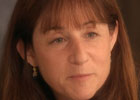
OLC has a very proud history of standing up for the law and basically defining the law for the government; telling the executive branch what it can and can't do. And so what it's supposed to do is set limits and basically advise the government.
In this case, though, when they had John Yoo acting as the most powerful person in the OLC -- he puts himself as an academic with very radical views. He almost had an experimental approach to the law, which he then used to advise the White House, gave them much more flexibility than most people would have in the legal establishment. …
What critics will say that they did was that instead of acting judiciously, they acted as if the White House was their client and they were the lawyers for the mob. And they were starting to look for loopholes so that the White House could do what it wanted to do politically, and they were going to find a way for the White House to do that and go where it wanted to go. Rather than setting the limits and saying that their client was the U.S. Constitution, and the government at large, they basically became sort of partisans for the White House during this period.
Can you tell whether that's by design or accident?
From interviewing many people, I think that OLC was acting in reaction to David Addington, and David Addington was pushing the Office of Legal Counsel to go in a certain direction that was a policy direction that Vice President Cheney wanted to go in.
Douglas Kmiec
Assistant attorney general, Office of Legal Counsel, 1985-'89
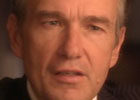
The bull's-eye, I think, was always on OLC in any political administration because we do have the capacity to be the naysayers. People are enthusiastic about their ideas, and that's why they come to Washington in the first place. Ideology motivates them and they want to get things done. … Now, it's our duty to some degree to try and find a way, as most lawyers do, to implement policy if possible. But if it's not possible, we ultimately have to say no. So that bull's-eye is there.
And more than once, people would express annoyance at the presence of the Office of Legal Counsel upon their arrival in a meeting. One could sense it by the arched eyebrow of, "Oh well, here they come," kind of reaction to our presence. And sometimes, even in the best of administrations, maybe it's the nature of politics, they would try and find some way to go around us, to appeal to the president directly, to have him disregard the legal advice that we were giving.
There was even one occasion I can recall from my own experience, where the advice we gave never made it to the president's desk. Someone in the White House decided that the policy objective was too important and the president couldn't hear what we wanted to tell him, or needed to tell him.
home . introduction . watch online . interviews . themes . join the discussion
producer's chat . readings & links . site map . dvd & transcript . press reaction
teacher's guide . credits . privacy policy . journalistic guidelines . FRONTLINE series home . wgbh . pbs
posted october 16, 2007
FRONTLINE is a registered trademark of wgbh educational foundation.
main photograph © corbis, all rights reserved
web site copyright WGBH educational foundation
